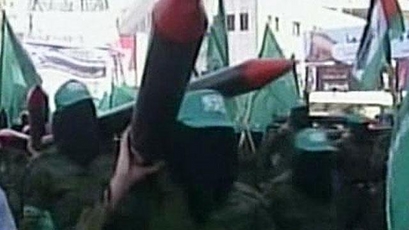RAMALLAH, West Bank – Palestinian President Mahmoud Abbas is making a heavy push for reconciliation with Hamas and is willing to give up hundreds of millions of dollars in U.S. aid if that's what it takes to forge a Palestinian unity deal, a top aide said Monday.
The comments were the latest sign that Abbas is giving up on stalled peace talks with Israel and prefers to pursue unity with Gaza's Hamas rulers as he makes a push toward independence.
"Of course we need the American money. But if they use it as a way of pressuring us, we are ready to relinquish that aid," said Azzam Ahmed, an Abbas aide.
The U.S. and Israel consider Hamas a terrorist group. The U.S. administration, the largest single donor to the Palestinians, withheld funds when Hamas was a part of a short-lived unity Palestinian government. The Palestinian Authority is heavily reliant on foreign aid and forgoing the funds could easily spark its own crisis.
The Palestinian unity government, isolated internationally because of Hamas' refusal to recognize Israel's right to exist, collapsed during a five-day civil war in 2007 that ended with the Islamic militant group seizing power in the Gaza Strip.
Since then, the Palestinians have been divided between rival governments in the West Bank and Gaza, the two territories they hope to turn into an independent state.
With peace talks stalled since September, Abbas has begun an effort to win international recognition of Palestine, with or without an agreement with Israel. That effort is to culminate at the United Nations in September.
Speaking in Jerusalem Monday evening, Israeli Prime Minister Benjamin Netanyahu warned that reconciliation with Hamas could spell the end of peace talks. "You can't have peace with both Israel and Hamas. Choose peace with Israel," Netanyahu said.
Israel, the U.S. and the EU consider Hamas a terror group because of its rocket attacks and suicide bombings aimed at Israeli civilians.
Palestinian officials acknowledge that they must solve their differences with Hamas before they can go to the United Nations. Abbas has made repeated overtures toward Hamas in recent weeks — including an offer to visit Gaza to lay the groundwork for national elections. Over the weekend, he met with local Hamas officials in the West Bank.
"The president is working hard in order to bring about a unified Palestinian territories before he goes to the U.N.," Ahmed said.
Hamas leaders say they want a full power-sharing deal before meeting with the Palestinian president — including a deal on how to divide security responsibilities.
"This visit should be for the sake of achieving progress on the ground and not only for photos and media coverage," said Mushir al Masri, a Hamas spokesman in Gaza. "The problem is not in forming the government, it's in reaching an agreement."
Hamas is demanding further gestures from Abbas before considering unity, such as a release of hundreds of Hamas prisoners locked up in the West Bank, re-opening closed Hamas charities and the removal of a ban on Hamas activities in the West Bank.
Palestinian analysts say Hamas has hardened its negotiating positions recently and is feeling empowered by the recent upheavals in the Arab world, particularly in Egypt, where its ally, the Muslim Brotherhood, is expected to play a key role in the new regime.
Ayman Hussein, a West Bank Hamas member who recently met Abbas in Ramallah, said Abbas appeared "serious in his efforts" to reach out to Hamas and was pessimistic about the peace process with Israel.
Hanna Amerah, a member of the PLO executive committee, said Abbas is waiting for an official response from Hamas about his initiative to go to Gaza and expects an answer within a few days.
He claimed Abbas has support for his move from the European Union, the U.N. and the Arab League. But giving up on the U.S. and Israel could come at a heavy price.
The Palestinians receive more than $470 million a year in direct financial assistance from the U.S. The U.S. hasn't said what it will do if Hamas returns to power in the West Bank, but it will likely cut off the funds unless Hamas agrees to renounce violence and recognize Israel. Hamas has given no indication it is prepared to do either.
The comments were the latest sign that Abbas is giving up on stalled peace talks with Israel and prefers to pursue unity with Gaza's Hamas rulers as he makes a push toward independence.
"Of course we need the American money. But if they use it as a way of pressuring us, we are ready to relinquish that aid," said Azzam Ahmed, an Abbas aide.
The U.S. and Israel consider Hamas a terrorist group. The U.S. administration, the largest single donor to the Palestinians, withheld funds when Hamas was a part of a short-lived unity Palestinian government. The Palestinian Authority is heavily reliant on foreign aid and forgoing the funds could easily spark its own crisis.
The Palestinian unity government, isolated internationally because of Hamas' refusal to recognize Israel's right to exist, collapsed during a five-day civil war in 2007 that ended with the Islamic militant group seizing power in the Gaza Strip.
Since then, the Palestinians have been divided between rival governments in the West Bank and Gaza, the two territories they hope to turn into an independent state.
With peace talks stalled since September, Abbas has begun an effort to win international recognition of Palestine, with or without an agreement with Israel. That effort is to culminate at the United Nations in September.
Speaking in Jerusalem Monday evening, Israeli Prime Minister Benjamin Netanyahu warned that reconciliation with Hamas could spell the end of peace talks. "You can't have peace with both Israel and Hamas. Choose peace with Israel," Netanyahu said.
Israel, the U.S. and the EU consider Hamas a terror group because of its rocket attacks and suicide bombings aimed at Israeli civilians.
Palestinian officials acknowledge that they must solve their differences with Hamas before they can go to the United Nations. Abbas has made repeated overtures toward Hamas in recent weeks — including an offer to visit Gaza to lay the groundwork for national elections. Over the weekend, he met with local Hamas officials in the West Bank.
"The president is working hard in order to bring about a unified Palestinian territories before he goes to the U.N.," Ahmed said.
Hamas leaders say they want a full power-sharing deal before meeting with the Palestinian president — including a deal on how to divide security responsibilities.
"This visit should be for the sake of achieving progress on the ground and not only for photos and media coverage," said Mushir al Masri, a Hamas spokesman in Gaza. "The problem is not in forming the government, it's in reaching an agreement."
Hamas is demanding further gestures from Abbas before considering unity, such as a release of hundreds of Hamas prisoners locked up in the West Bank, re-opening closed Hamas charities and the removal of a ban on Hamas activities in the West Bank.
Palestinian analysts say Hamas has hardened its negotiating positions recently and is feeling empowered by the recent upheavals in the Arab world, particularly in Egypt, where its ally, the Muslim Brotherhood, is expected to play a key role in the new regime.
Ayman Hussein, a West Bank Hamas member who recently met Abbas in Ramallah, said Abbas appeared "serious in his efforts" to reach out to Hamas and was pessimistic about the peace process with Israel.
Hanna Amerah, a member of the PLO executive committee, said Abbas is waiting for an official response from Hamas about his initiative to go to Gaza and expects an answer within a few days.
He claimed Abbas has support for his move from the European Union, the U.N. and the Arab League. But giving up on the U.S. and Israel could come at a heavy price.
The Palestinians receive more than $470 million a year in direct financial assistance from the U.S. The U.S. hasn't said what it will do if Hamas returns to power in the West Bank, but it will likely cut off the funds unless Hamas agrees to renounce violence and recognize Israel. Hamas has given no indication it is prepared to do either.




No comments:
Post a Comment